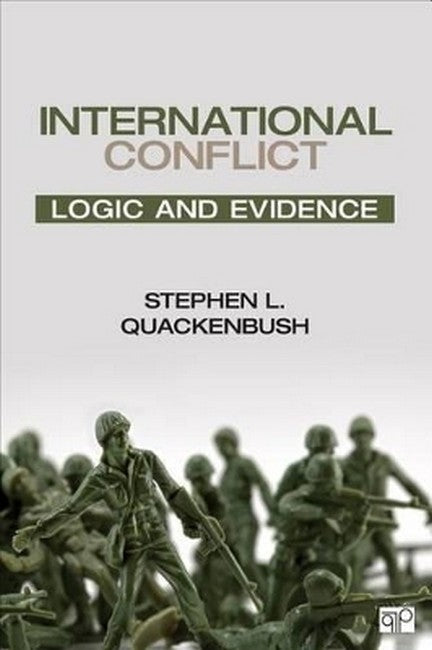Stephen L. Quackenbush is Associate Professor of Political Science at the University of Missouri. His research and teaching focuses on international conflict. Specific areas of interest include understanding the dynamics of deterrence, the effect of settlements on recurrent conflict, and the effect of strategy and other factors on war outcomes. He is the author of Understanding General Deterrence: Theory and Application, and his research has been published in journals such as the Journal of Politics, Journal of Conflict Resolution, Political Research Quarterly, Journal of Peace Research, International Interactions, Conflict Management and Peace Science, and Review of International Studies. He served as an Army officer, including a year in Iraq in 2004, receiving the Bronze Star Medal.
Request Academic Copy
Please copy the ISBN for submitting review copy form
Description
Part I: Foundations Chapter 1: The Scientific Study of War What Is Science? The Scientific and Classical Approaches Levels of Analysis Dangerous Dyads A Process Model of War Conclusion Key Concepts Chapter 2: Identifying Wars and Militarized Disputes International Conflict in the Past Two Centuries Defining War Militarized Interstate Disputes Other Measures of International Conflict Conclusion Key Concepts Chapter 3: Rational Choice Theory Rationality Expected Utility Theory Game Theory Bargaining Model of War Conclusion Key Concepts Part II: Causes of War and Militarized Disputes Chapter 4: Contiguity and Territory Contiguity and International Conflict Identifying Opportunity for Conflict Territorial Issues and International Conflict Conclusion Key Concepts Chapter 5: Power Defining and Measuring Power Polarity and Stability Offense-Defense Balance Power Transition Theory Conclusion Key Concepts Chapter 6: Alliances Types of Alliances Why Do States Form Alliances? Drawbacks of Alliances Measuring Shared Interests Alliances and Conflict Conclusion Key Concepts Chapter 7: Democratic Peace Empirical Findings Regarding the Democratic Peace Explaining the Democratic Peace The Kantian Triangle Alternative Explanations Conclusion Key Concepts Chapter 8: Deterrence Types of Deterrence Classical Deterrence Theory Perfect Deterrence Theory Conclusion Key Concepts Chapter 9: Escalation of Disputes to War Patterns of Escalation Contextual Factors Leading to Escalation Strategy, Interaction, and Escalation Conclusion Key Concepts Part III: The Conduct and Aftermath of War Chapter 10: Military Doctrine and Strategy The Study of Warfare Military Strategy Principles of War Modeling Combat Conclusion Key Concepts Chapter 11: Evolution of War War Expansion War Duration War Outcomes Conclusion Key Concepts Chapter 12: War Termination and Consequences Bargaining and War Termination Consequences of War Conclusion Key Concepts Chapter 13: Recurrent Conflict and Rivalry Recurrent Conflict Settlements and Recurrent Conflict International Rivalry Conclusion Key Concepts Part IV: Conclusions Chapter 14: What Have We Learned About War? The Cumulation of Knowledge The Importance of Theory Key Concepts
"International Conflict: Logic and Evidence is a superb introduction to the ideas and apparatus of the conflict processes field. The book covers the entire process of war in a succinct way. By the last page, students have a basic familiarity with offense and defensive realism, stability, and polarity, expected utility theory, and other major areas of the literature." -- Patrick James "Quackenbush has written a highly readable and intellectually stimulating book. I have no doubt that students will find the content useful for advancing their understanding of warfare. Equally importantly, the book's emphasis on explaining the scientific method and carefully delineating various approaches to scientific research make it especially useful. Indeed, the book helps readers understand how the social sciences 'do' science, which is one of its most unique and appealing features." -- Bruce W. Dayton "International Conflict: Logic and Evidence is a textbook that could serve as both a text and also a great reference for original research. It collects and generalizes some of the most focused and important research topics in the scientific study of war over the past thirty years (at least)." -- Brent Steele

